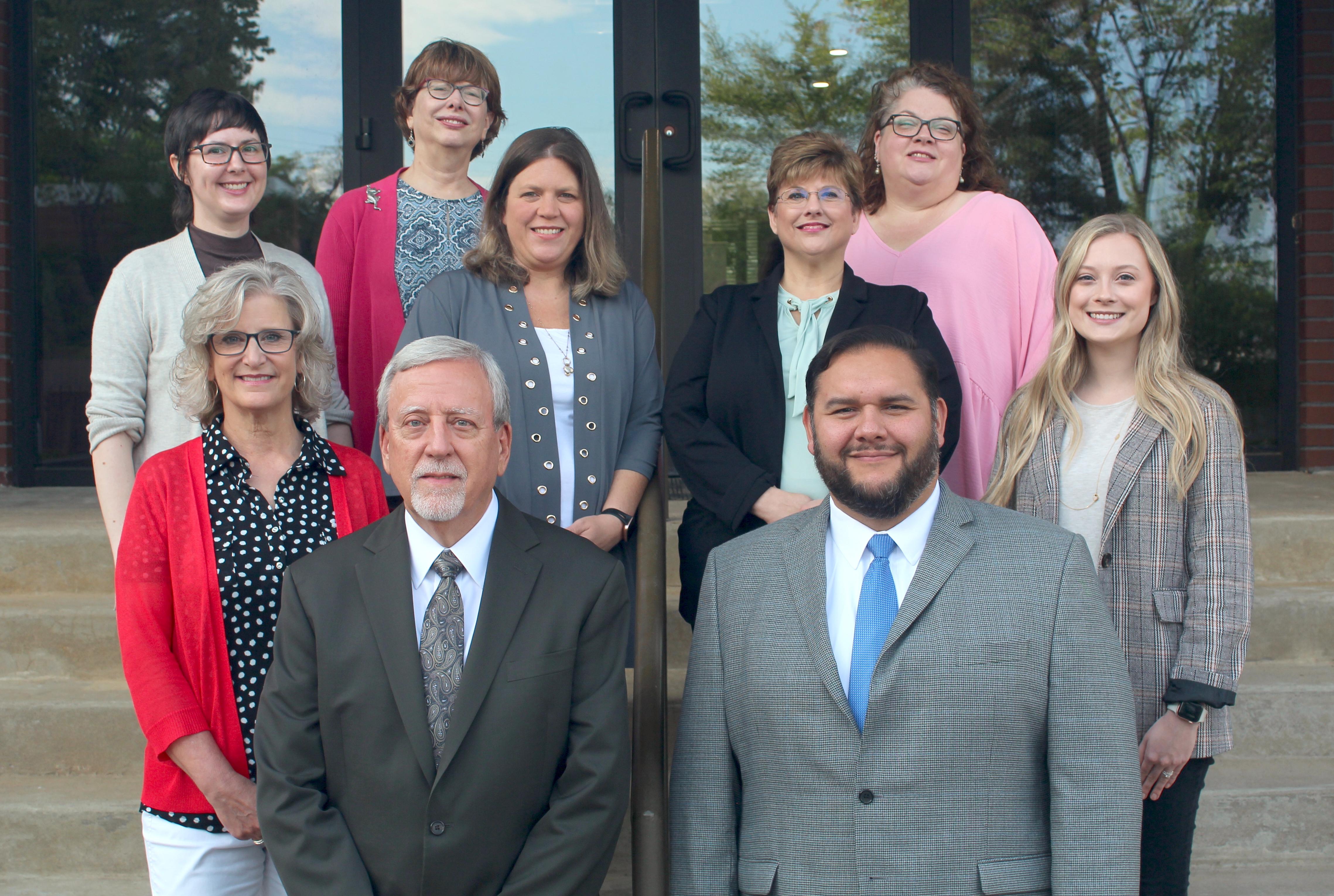




AASA Superintendent Symposium, January 10-11, 2023 DoubleTree Hotel, Little Rock
AACIA Conference, January 24, 2023 Benton Event Center, Benton
Tel-AR Conference, February 10, 2023
University of Central Arkansas, Conway
AASBO Conference, February 9-10, 2023 Hot Springs Convention Center
ArkASPA Conference, February 23, 2023 Wyndham Riverfront, North Little Rock
AACTEA Conference, April 10-11, 2023 DoubleTree Hotel, Hot Springs
CASBO Certification Classes, April 11-12, 2023 Benton Event Center, Benton
ASPMA Certification Classes, TBD
ASBA/AAEA
AAFC
Conference, May 2,
North Little Rock
May 3-5,
AASEA
AAEA
AAEA
Skipper
Shawn
Smith
Dr.
Kevin
Board Secretary Assistant Superintendent, Benton
Kelvin Gragg
Secretary
Matt Ziegler
President
Lisa AACTEAHotsenpiller President
&
Administrator/Supervisor, Fayetteville
Carla Curtis
President
of
Aliza Jones
President (until
Dr. Stephanie Nehus
Past President Superintendent, Hot Springs
Carol Skiba
President
Dr. Karla Tarkington
President-Elect
Julie Adams
President
Programs Coordinator, DeWitt
Dr. Steven Weber
President
Superintendent, Fayetteville
Craig Dupuy
President (begin Oct) Superintendent, Cleveland County
Jarod
Dr. Mike Hernandez

The Joint Education Committee has completed its study and recommendations for adequacy for the upcoming biennium. However, the recommendations are not what I would call “joint.” The House and Senate Committee have developed different recommendations that the 94th General Assembly will have to review and decide on funding and expectations of that funding for our public school districts. It is always wonderful when all parties can see eye to eye on these matters, but it just simply is not that way nowadays. Although resolutions may be developed down the road, there are currently more questions than answers on what funds will be available going into the 2023-2024 school year. The positive aspect is that the legislature seems willing to invest more in public education and address salaries for certified and classified employees.
The election season of 2022 is quickly coming to an end, and I am so happy to get this behind us. This has been one of the most polarizing election seasons I can remember. There are the normal highly contested races across the state, but these now include school board elections. Hopefully, this will not become the norm, but is simply the result of the census causing redistricting and coming out of an oddly divisive pandemic. There have been plenty of opportunities for people with malicious intent to attack our public schools for health policies, book policies, and test scores based on pandemic learning. School personnel should be commended for the work done over these last few years in keeping schools open, and students focused on learning as much as possible. There are better days ahead because we are better prepared, and I think parents overall have a greater understanding of why students need to be in school and what students are learning each day.
I know the natural reaction to being attacked is to find some form of retribution. We are better than that. We have had years of practice dealing with the unpleasant and angry. This is when administrators must listen more and try to mend fences and build positive relationships. In any environment, conflict can only last so long, and rarely is there ever a true winner. Just look at Rocky Balboa and Ivan Drago. Ivan was invincible, well-trained, and supported by the most advanced biochemistry available in the USSR. Rocky was well-trained and not afraid of a fight. Rocky won, but what did they both lose? Tune into Rocky V and the Creed series to find out. The bottom line is we have to be wary of those trying to attack us as leaders and public education in general. We must be measured and thoughtful in our responses and ensure that we are not taking our focus off of the students. You only have so much bandwidth; we must use this for good work and building positive relationships.
Over the next several months, we must focus on building strong positive relationships with our current and potential newly elected government officials. Regardless of politics or philosophies, we must work hard to find common ground with our local and state leaders. The voters have elected these folks, and they have tremendous authority and responsibility, so we must work to support them so, in turn, they can help us. Of course, not all areas will be agreed upon, but we must strive to stay in the conversation. Tactics of the past and hostile attacks will not work and can only ensure a divisive environment between schools and elected officials. We are always up for a fight but must be mindful of the players and the cost.
I hope you have an excellent November, and know that we at AAEA are thankful for you and what you do every day for the students in Arkansas. We are here to support you.


I would like to thank Dr. Hernandez, the AAEA staff, and everyone who attended the AAEA Fall Conference on October 18th at the Benton Event Center. The day was very beneficial and well attended. The focus on communication and branding was definitely relevant and informative.
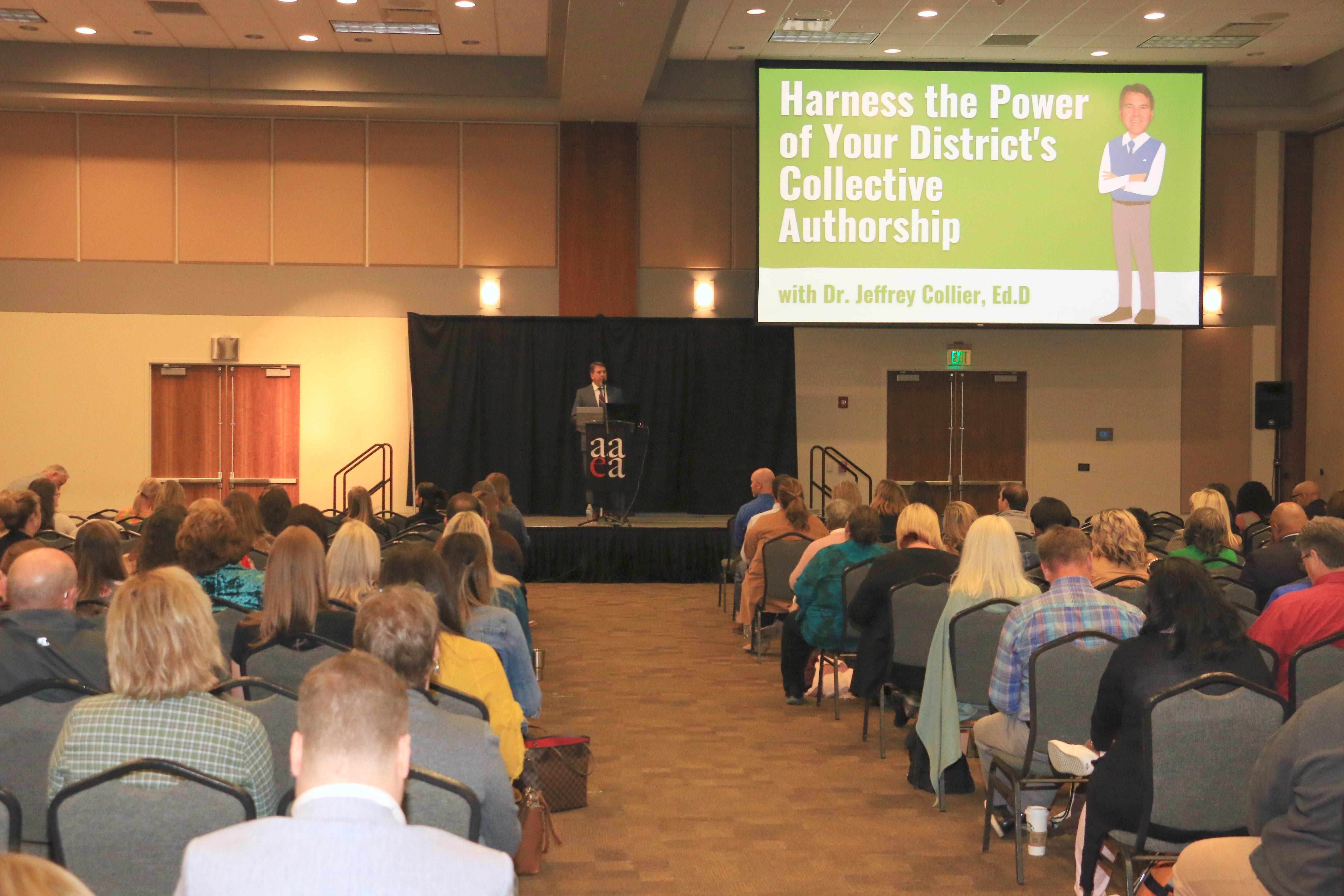
National Principals Month honors principals for their significant impact on the success and well-being of our nation’s students. Principals, thank you for being a guiding light for our schools. We enjoyed celebrating you during the month of October.
Also, the National Association of Secondary School Principals (NASSP) will be hosting the School Leaders Conference in Denver in July 2023. This is the first national school leadership conference held by NASSP in four years. We know that the pandemic created new challenges for educational leaders. This conference will provide new insights into dealing with many issues surrounding education. Any school leader is welcome to register and attend. IGNITE 2023 is the premier conference in the nation for secondary school leadership. You can find more information at ignite.nassp.org.
Over the past several months, school administrators have been closely watching the proceedings of the Joint Education Committee as they have worked through the process of conducting the "Adequacy Study.” This review will lead to a final report and recommendations for school funding in the next biennium. The final Adequacy report and recommendations are due by November 1. So, what is Adequacy? Why is it so important? A typical question, especially at this time of the year and especially by those that may not be familiar with the history of the Lakeview lawsuit and past Adequacy studies.
The Arkansas legislature is charged with studying the state's educational system to determine how it can offer an adequate education to all Arkansas public school students. The requirements of that study are specified in Act 57 of the Second Extraordinary Session of 2003, which requires the House and Senate Education Committees to study the system and report their findings and recommendations. The adequacy study is a key element in the continued constitutionality of the state's system of funding public education.
The end result of this months-long process will be a list of recommendations that will be presented to the General Assembly prior to their convening in January 2023. A highly anticipated report that will provide the framework, and recommended funding, for numerous decisions made by school districts over the next two years on salaries, curriculum/instruction, and facilities. Here's the link to this and past years' Adequacy Reports.



The newest member of the AAEA Staff is Sharon Chuculate. Sharon has been employed with AAEA for 4 months, beginning July 1, and assists the AASBO and AAFC groups, organizing their classes and conferences, and in providing ongoing support. She also helps school districts when they have questions or other needs in Finance, assists with Tier I presentations, and visits districts to provide Tier II training. Sharon works with Mr. Mertens and the new superintendent group and will be working with the Finance & Facilities
Before coming to AAEA, Sharon worked for the Clarksville School District in payroll and then as Business Manager for 6 years. Prior to that, she was employed with the Ola/Two Rivers School Districts for 19 years as bookkeeper and Business Manager.

Sharon says her favorite part about working at AAEA is that she loves to help people in their jobs and to visit with AAEA members during classes and conferences. During her time off, she and her husband spend time with their four children, and five grandsons who are very active in soccer, baseball, football, band and mountain biking. She says "We keep the Arkansas roads hot running to each activity and we love it!"

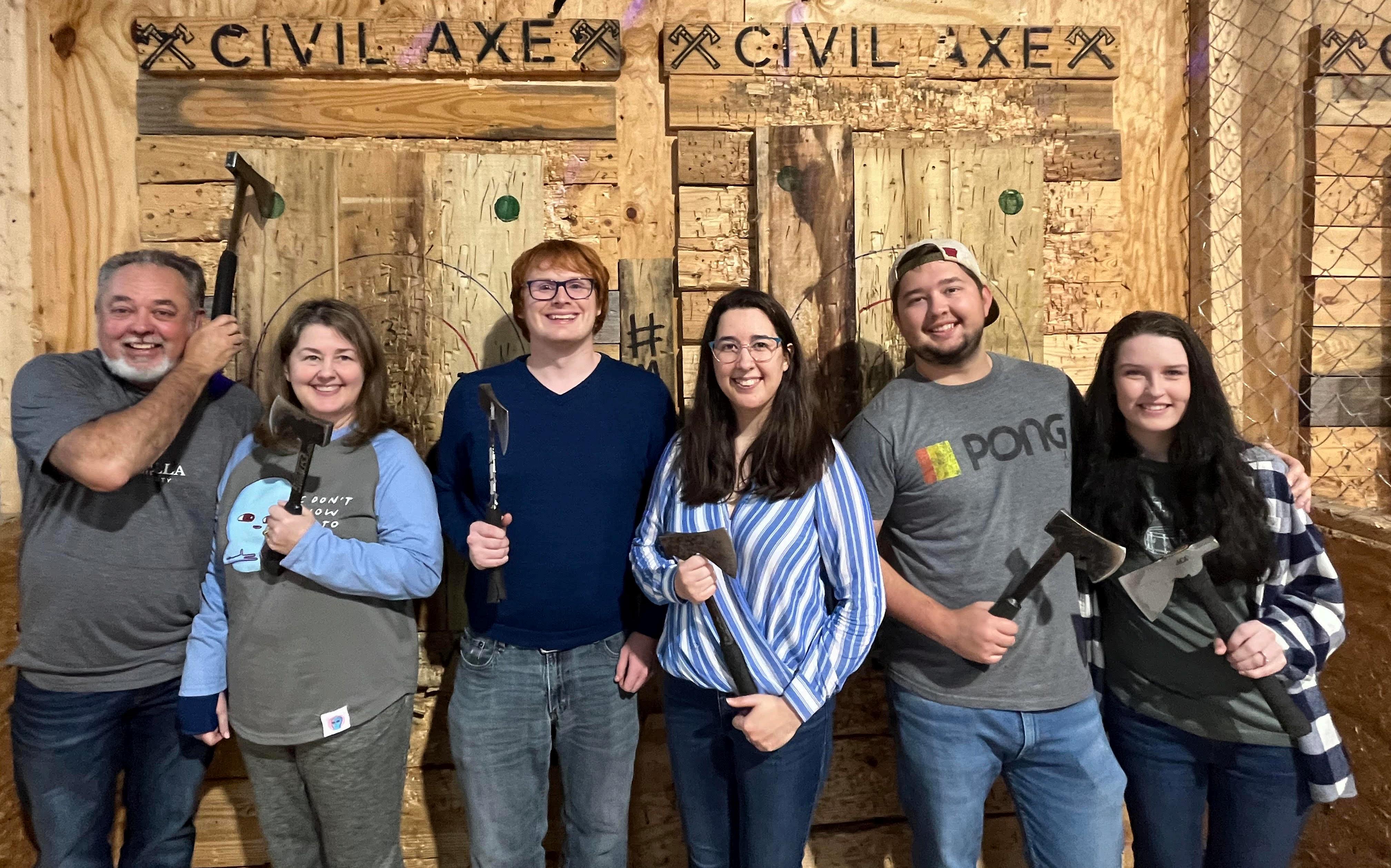


Charles Warren says that despite coming from a family full of educators – his father, mother, brothers, and later even his children and their spouses all pursued the field of education – the teaching gene skipped him. He instead was drawn to accounting and business and worked for two CPA firms before joining the education field himself. He says, "During that time, to get closer to the 'family business,' I got very involved in PTA. I have served as the Treasurer and President at the district-level Fort Smith Council PTA and the state-level Arkansas PTA. When the CFO position opened at Fort Smith Public Schools, I applied, even though I had no real experience in governmental accounting. I truly believe my passion for education and PTA helped me land this dream job." Charles states he is grateful to Dr. Benny Gooden, who was superintendent at the time, for teaching him school business and better preparing him as CFO for subsequent superintendents.
Charles says his favorite thing about his job is the problem solving. “School Business Officials are presented with problems or issues – big and small – to be addressed or solved. Working on a spreadsheet, analyzing data, and solving that puzzle is extremely gratifying." He says the most challenging aspect of his job is that "the demands of legislators, stakeholders, staff, and students are constantly changing. Finding the funding for all of it is real. The challenge is to eliminate the reasons we can’t do something to find a way we can do something." For those considering a similar career, he says, "Being a teacher is an incredibly rewarding and thankless job. Teachers are underpaid and overwhelmed, but they affect kids every day. Some of us do not have the skills to be in the classroom, but the experience and skills of an accountant can be used to support the classroom and make that teacher’s job and life a little bit easier or less burdensome so that more time can be spent with the kids. I tell a new school business official 'you are not just an accountant now, you are an educator.'"
Charles hopes to be seen as "one of many members of the Warren family that made a positive impact on public education in Arkansas." His efforts to that effect have so far been recognized with several awards. In 2020, he received the Arkansas Society of CPAs Outstanding CPA in Government award. That state-level application was forwarded to the national level, where he also won the American Institute of CPAs Outstanding CPA in Government Local Impact award in 2022. In September 2022, he received the Pinnacle of Excellence award from ASBO International for finding a creative solution to a district issue. He says, "Professionally, the day I received the Pinnacle of Excellence award in Portland, OR was remarkable. I gave a speech from a teleprompter for the first time. The ASBOI members and staff really made me feel special."
How would your co-workers describe you?
Grumpy is the first word that comes to mind. I believe I’m perceived to be introverted, pensive and creative. I am not afraid of the label “creative accountant.” I think it is necessary at times.
What do you enjoy doing during your time off?
I play tennis regularly. My wife, Missy, and I attend movies all the time. We can sometimes speak in movie quotes.
What might other administrators be surprised to know about you?
As introverted and quiet as I am naturally, I’ve performed for the Fort Smith Little Theater over the last 16 years.
What is the most daring thing you’ve done?
In 2019, after an absence of 30 years, I returned to college at the ripe old age of 52 to complete my MBA.

What is one of the things on your “Bucket List?”
My bucket list is movie related. I have run up the “Rocky” steps at dawn in Philadelphia. I have run the “picket fence” in the gym where Hoosiers was filmed. I still want to run barefoot on the beach at St. Andrews in Scotland (Chariots of Fire) and sing “Do-Re-Mi” on the steps of Mirabell Palace in Salzburg (Sound of Music).
Where do you see yourself in five years?
Five years away from retirement with a whole lot more stories that begin with “Remember when we had to deal with…”
What is the best advice you have ever received? Admit your mistakes, determine how it happened and set up a system to avoid repeating it.
What do you see as the biggest benefit of AAEA membership?
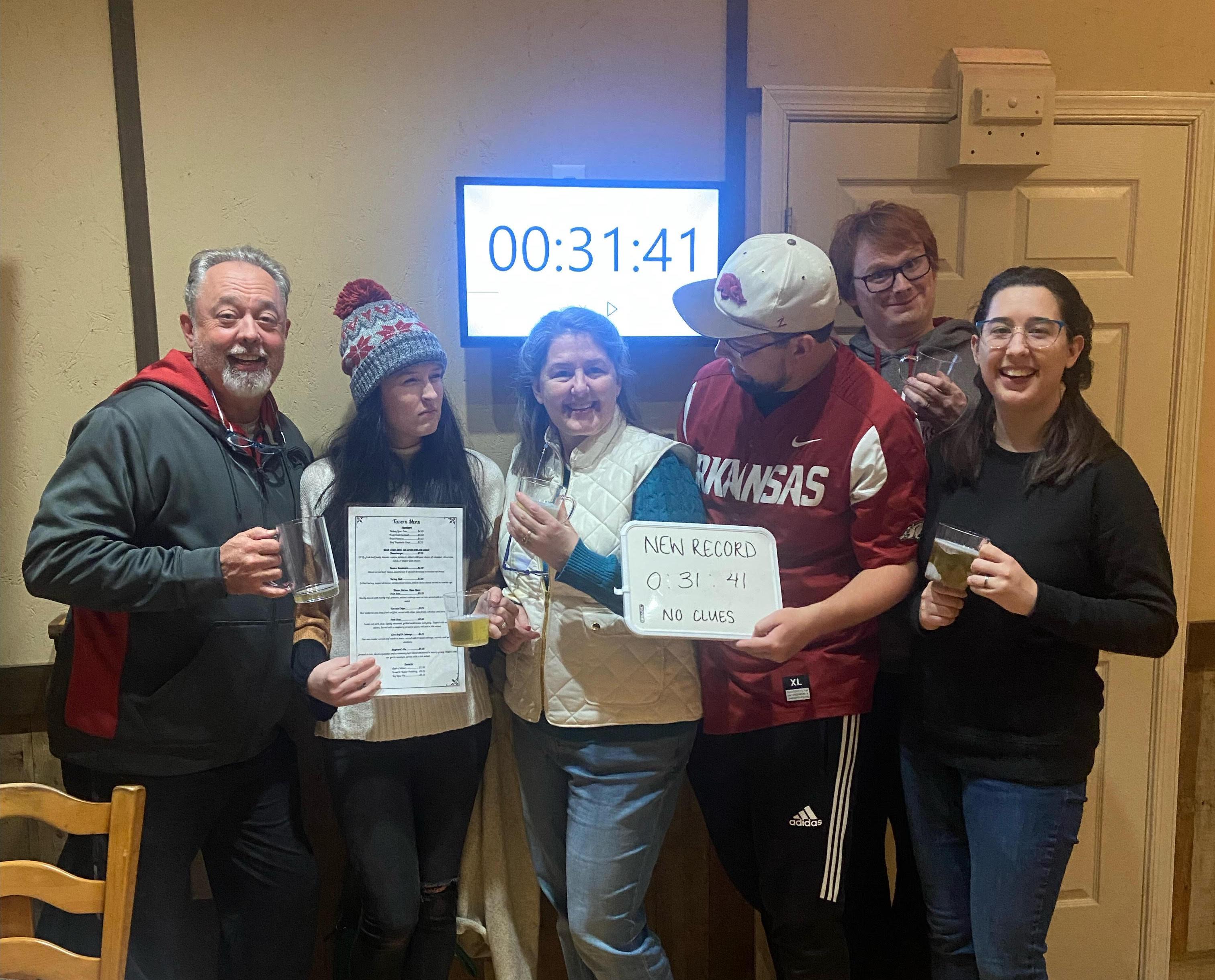
AAEA allows you to build relationships so that you don’t feel so isolated as a School Business Official. A quick conversation of “how are you doing this?” can reduce stress and save time.

Craig Dupuy was presented the President’s Blue-Ribbon Award at the ASPMA annual conference in Hot Springs on October 4. This annual award is given to deserving Arkansas School Plant Management Association members who have demonstrated quality leadership and have contributed their talents, efforts, and abilities for the betterment of Arkansas school facilities. Craig is currently superintendent of the Cleveland County School District. He has been active in ASPMA for many years serving on the scholarship and certification committees, the executive board, and will be president of the association this year. He has served as a mentor for a number of new school plant managers and other school administrators over the years. Congratulations to Craig on a recognition well deserved!
The AASBO Board of Directors is now accepting nominations for the 2023 Truett Goatcher Arkansas School Business Administrator of the Year. This honor will be awarded based on:
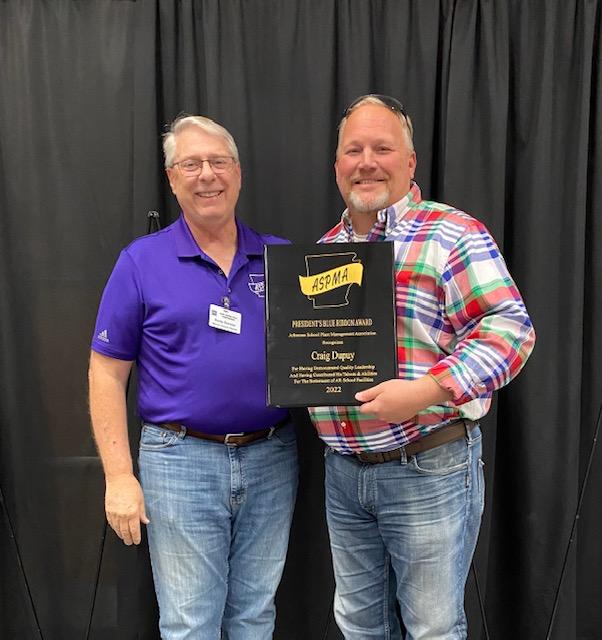
• Experience in school and non-school business, and other school experience
• Service to AASBO, AAEA, DESE and school business committees
• Education and professional development

• Work responsibilities and community service
Truett Goatcher was a long-time member of and an advocate for AASBO. He worked faithfully for many years at the ADE and the AAEA to assist school business officials with financial support, planning, analysis, and funding forecasts. A mentor to many current Arkansas school business officials, he was loved and highly respected in our profession.
If there is a current AASBO member in your district, co-op area, or anywhere in the state you believe is worthy of this nomination, please complete the form and return it to AAEA. The deadline for nominations is November 25, 2022.
Click here for a nomination form.
Please contact Sharon Chuculate at s.chuculate@theaaea.org if you have any questions regarding this process.

Social Security - Social Security is a government benefit that provides financial support to retirees or the disabled. It's one of the largest sources of income for retirees but is impacted by inflation differently than other retirement plans. A critical part of Social Security is an annual review of the inflation index. This review aims to protect beneficiaries from losses in purchasing power. The United States Social Security Administration adjusts benefits yearly based on the cost of living as measured by the CPI-W. Unfortunately, these adjustments have historically been low. This may leave people feeling as though they have lost some of their purchasing power over time.
Pensions - Some retirees will rely on their pensions as a primary source of income when they retire. A pension is guaranteed to provide you with a fixed amount for the rest of your life. However, there are ways in which inflation can impact pensions. For example, benefits from a pension plan are typically tied to the employee's last several years' salary. Because benefits may be based on pre-inflation salaries, a retiree's benefits could be negatively impacted if high inflation occurs during their recent years of work. In addition, inflation adjustments may or may not be included in your pension benefits. If your pension updates for inflation, corrections will be made regularly throughout your retirement. If your pension does not adjust for inflation, you will need to make up the difference on your own.
401(k) Plans - Inflation may impact your 401(k) account too in a variety of ways, impacting the value of current investments, reducing the purchasing power of current savings or income payments, or both. The purchasing power of your money shrinks when inflation rises, meaning your dollars don't go as far. Therefore, extended periods of inflation can mean you get less for your savings. Learn the importance of investing in your 401(k).
The best way to soften the blow from inflation, is to educate yourself on different options to customize your retirement plan. Learn more about annuities, Individual Retirement Accounts (IRAs), using a Health Savings Account (HSA), and buying life insurance plans to help supplement your retirement savings. View the full article here.
Joseph Allen runs a major public health research project at Harvard University, probing how indoor air quality affects human health and cognition. He consults with companies on ventilation and air filtration, and during the pandemic he became a prominent voice on public health, writing dozens of op-eds criticizing early guidance from health authorities and debunking misconceptions about how the virus spreads.
In 2014, Allen accepted a position at Harvard, where he soon turned his attention to how the indoor environment can affect people’s cognitive abilities. Many of us have struggled to pay attention during a long staff meeting in a stuffy conference room. Research by Allen and others suggests that lassitude may not be due solely to boredom, but also to the carbon dioxide (CO2)-rich conference room air.
Ever since the energy shocks of the 1970s, buildings in the United States have been made as airtight and energyefficient as possible. The result was a buildup of toxic volatile organic compounds (VOCs) and exhaled CO2. “Green building standards” introduced in the late ’90s focused on reducing toxic materials and making buildings healthier as well as more sustainable, but they didn’t
prioritize indoor air quality and ultimately did little to improve it.
In a multiyear series of experiments, Allen and his team have investigated the consequences. In the first study, published in 2015, they had 24 white-collar volunteers spend six working days in environmentally controlled office spaces at Syracuse University’s Total Indoor Environmental Quality Laboratory. On various days the experimenters would alter ventilation rates and levels of CO2 and VOCs. Each afternoon the volunteers were tested on their ability to think analytically and react to a crisis. (One test, for example put the volunteer in the role of a small-town mayor trying to react to an emergency.) All tests were double-blind: Neither the volunteers nor the study personnel knew that day’s environmental conditions.
The results were dramatic. When volunteers worked in well-ventilated conditions (which lowered the levels of CO2 and VOCs), they scored 61% higher than when they worked in typical office building conditions. When they worked in the cleanest conditions, with even lower CO2 levels and higher ventilation rates, their scores climbed 101%.

Thanksgiving begins what we Americans think of as "the holiday season", and it is just around the corner. For many of you, it will be a welcome four-day break from work--one you will celebrate with family, friends, food--lots of really good, fattening food--and football.
However, this holiday season, I challenge you to place your focus on gratitude. Gratitude, stemming from the Latin word gratus, means "thankful." The practice of gratitude involves two steps:
• recognizing that something positive has happened
• identifying the source of this positive happening
Furthermore, gratitude has to be intentional--it does not come naturally. Young (n.d.) writes that "[w]e humans have a negativity bias, which means that we're wired to notice threats in the environment." She further states that when we do recognize good, we let it "slide off us fairly quickly." So, it takes more effort to stay focused on what we have to be grateful for and maintain an attitude of thanksgiving.
Perhaps, as Thanksgiving ushers in this holiday season, you could practice being more intentional about gratitude. Young suggests three ways you can choose from:
1. Every day, list three positive things that have happened within the last twenty-four hours. Be sure to recognize their sources: a higher power, nature, another person, yourself.
2. Once a week, think of a positive experience you have had and write about it for five minutes. Remind yourself of the goodness in life as you relive the experience.
3. Each week, write a letter of gratitude to someone who has brought goodness to your life. Sending it is optional.
Happy Thanksgiving everyone! We at Coryell Roofing are grateful for each of you who contributed to this newsletter and each of you reading it. Our hearts are full as we recognize your efforts in educating the children in the great state of Arkansas and these great United States of America.

Young, K. (n.d.) The Science of Gratitude--How it Changes People, Relationships (and Brains!) and How to Make it Work For You https://www.heysigmund.com/the-science-of-gratitude/
November is a time we reflect on the things we’re thankful for, so what better time to protect them? Investing in accident insurance could be the difference between unexpected expenses or a relaxing holiday season.
According to the National Fire Protection Association, Thanksgiving is the leading day for cooking fires at home with more than three times the daily average for these accidents. There were an estimated 1,400 fires on the holiday in 2019, often due to unattended cooking. These fires can also lead to injuries when children are left unattended.

Before arriving home for the holidays, you also face the risk of automobile related accidents. The National Safety Council estimates that around 515 people may die in the Thanksgiving holiday period due to traffic accidents. Even if an accident only results in injuries, these can be a costly burden during one of the most expensive times of the year.
Accident insurance helps pay for unexpected healthcare expenses due to injuries that occur every day – from the soccer field to the ski slope and the highway in-between. You can be insured for initial care, injuries, and follow-up care for covered accidents through your employer’s plan. This Thanksgiving, protect what you’re thankful for.
This segment features content from other AAEA publications. Our Two Cents is a monthly publication available to subscribing districts. The following excerpt comes from the October 2022 issue.
September net available general revenue totaled $766.1 million, 11% ($75.8 million) more than the same month a year ago and 20% ($128.7 million) above forecast. Revenue results were above forecast in all major categories.
State officials reported that corporate and individual income tax filings in September indicate the state is on track for a third consecutive year of high growth in incomes. Inflation continues to be a part of tax revenue gains nationwide. The August Consumer Price Index, posted September 13 by the U.S. Bureau of Labor Statistics, reported that all indexed items were up 8.3% compared with August 2021.
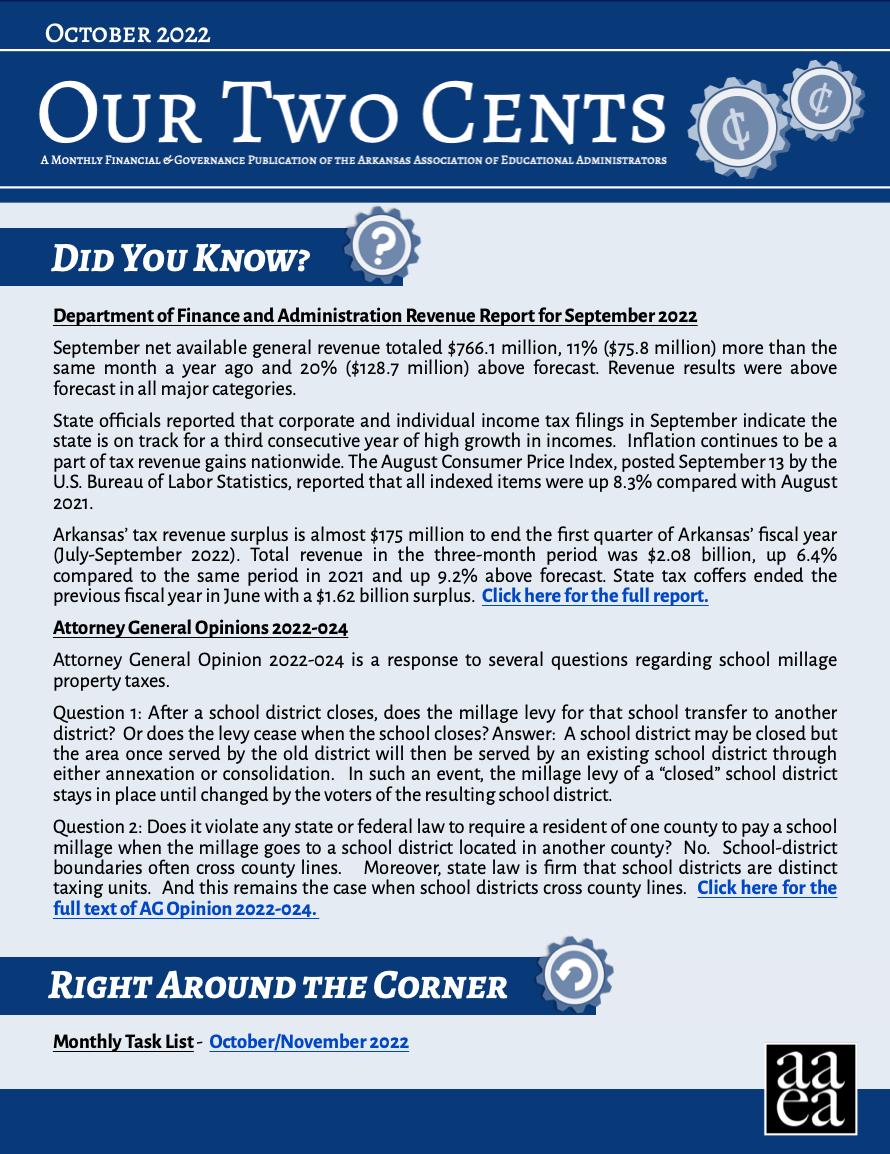
Arkansas’ tax revenue surplus is almost $175 million to end the first quarter of Arkansas’ fiscal year (July-September 2022). Total revenue in the three-month period was $2.08 billion, up 6.4% compared to the same period in 2021 and up 9.2% above forecast. State tax coffers ended the previous fiscal year in June with a $1.62 billion surplus. Click here for the full report.

Attorney General Opinion 2022-024 is a response to several questions regarding school millage property taxes.
Question 1: After a school district closes, does the millage levy for that school transfer to another district? Or does the levy cease when the school closes? Answer: A school district may be closed but the area once served by the old district will then be served by an existing school district through either annexation or consolidation. In such an event, the millage levy of a “closed” school district stays in place until changed by the voters of the resulting school district.

Question 2: Does it violate any state or federal law to require a resident of one county to pay a school millage when the millage goes to a school district located in another county? No. School-district boundaries often cross county lines. Moreover, state law is firm that school districts are distinct taxing units. And this remains the case when school districts cross county lines. Click here for the full text of AG Opinion 2022-024.
Interested in more from Our Two Cents? Contact our office at 501-372-1691.
The AAEA Job Board is a calendar-year subscription that assists districts with the everincreasing challenge of recruiting quality staff. It is a significant resource for educators, both in-state and out-of-state, seeking employment in Arkansas schools.
Over 165 school districts are participating in the program, which has been extremely helpful to schools and educators over the years. The site is used year-round and is accessed extensively during the second semester. It is not unusual to see over 400 jobs posted on the Job Board at one time. With an account, school districts may post unlimited job vacancies throughout the year.



